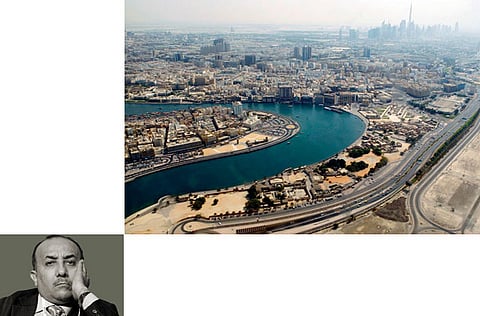Thinking big pays dividends
What is fascinating about the UAE is its ability to accomplish great feats despite being in a hostile region

In the Byzantine and real politik world of international relations, small states have no role in, or impact on, their regional environment, let alone the international system. But, of late, this assumption is being challenged by small and aspiring nations.
They are not only defying that logic, but becoming trendsetters, rubbing shoulders with the major powers and stealing the show from their larger and more experienced neighbours. That was the story of Kuwait in the past, and it is the story of countries like Qatar and UAE today. They are doing it with courage and great vision.
On the 40th anniversary of UAE’s independence it is time to take stock of a country that has been setting the trend in the Arab world in more ways than one. UAE has a unique political system as the first Arab federal state. The country is run as a corporation; taking on big projects with grand dreams. It has iconic landmarks. Today, they say if you want to see the future of the Arab world, visit Dubai, Abu Dhabi and Doha, and not other Arab capitals.
What is fascinating about UAE as a small nation state is its ability to accomplish these feats despite being in a hostile regional environment, with upheaval, wars, and also the occupation of its three islands by Iran. Add to that the ongoing Arab Spring. The UAE seems to be slogging it out and taking on more challenging tasks and roles. Along with Qatar, it is undoubtedly punching above its weight as they face and respond to various challenges.
But even before the Arab Spring, UAE was a success story. The founding father of modern UAE, Shaikh Zayed Bin Sultan Al Nahyan set the trend and helped establish the union in 1971. In the past 40 years, UAE has come a long way. Despite having a native population of less than one million, it has the second largest economy in the Arab World.
The entrepreneurial spirit of UAE is evident in its mega projects, like the Jebel Ali port complex in Dubai which hosts more than 6,000 companies from more than 120 countries, the Dubai Media City, the world renowned Emirates and Etihad airlines.
Add to this the fact that in 2009, Abu Dhabi became the headquarters of the International Renewable Energy Agency (Irena). For the first time, a developing country was to serve as the headquarters of a major international organisation. This reflects the growing role and the confidence in UAE at the international level.
The UAE also plays a leading role as a donor state, contributing through its Abu Dhabi Fund for Development (ADFD) — a “model institution in providing development assistance that alleviates global poverty”. ADFD has provided Dh12.5 billion in soft loans and grants to 53 countries to support various development projects ... “including agriculture, electricity, and water, transportation, industry, social, and heath care services, tourism and hospitality, telecommunications and studies and technical support”.
In addition, UAE has written off $7 billion (Dh13.47 billion) Iraqi debt and was among the first Arab countries to open its embassy in Baghdad. It was also “the only Arab country performing humanitarian activities on the ground in Afghanistan”, providing $550 million between 2002 and 2008. The UAE has “provided over $3 billion in aid to the Palestinians, including development funds for infrastructure, housing, hospitals and school projects”.
Power vacuum
The Arab Spring has highlighted even further the role of the GCC states, which are leading the Arab states in tackling the repercussions of the uprisings and the revolutionary changes sweeping the Arab World from Libya and Syria to Yemen. The role of both Qatar and UAE, who stepped in to fill the power vacuum left by lethargic regional powers affected by the sweeping winds of the Arab Spring, was peculiar.
My colleague Abdulkhaleq Abdullah in his recent column in Gulf News summed up the ascending role of the small states of the Gulf, namely UAE and Qatar, and how both are flexing their political muscles and becoming the trendsetters. “The ongoing Arab Spring is a game-changer and has created a power and a leadership vacuum ... More importantly, it is Qatar and UAE that have gained the most from the leadership vacuum in the region ...” This is what is called the “Soft Power”, the power of convincing others of the worthiness and the uniqueness of the model being discussed.
There is no doubt that the UAE like its brothers in the GCC is leading the Arab world today, in terms of economic and political developments, clout and initiatives. We saw that in Libya, where the GCC led the Arab countries against Muammar Gaddafi and Qatar and UAE participated in Nato-led operations. We see it today in Syria and Yemen too.
As the UAE celebrates its 40th anniversary, it faces mounting security, economic, social and political challenges. How to move forward with political reforms and development by capitalising on landmark elections for the Federal National Council held this year? How to lessen its overwhelming dependence on expatriates which renders the UAE nationals a minority in their own land? How to deal with the economic crisis without affecting the country negatively and stunting its economic growth? How the UAE will handle these challenges and what might be thrown at it will determine its fate and future. But that does not take away or lessen the success story the UAE has been scripting for the past four decades.
Professor Abdullah Al Shayji is the Chairman of the Political Science Department, Kuwait University. You can follow him on Twitter at www.twitter.com/docshayji


